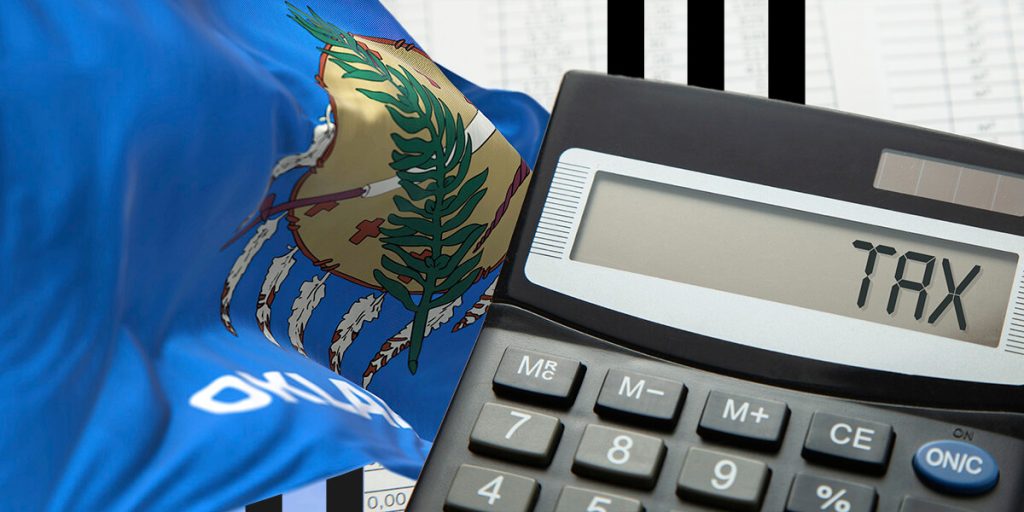
Sales tax is paid to a local or state governing body for the sale of certain services and goods. In Oklahoma, the state sales tax is 4.5%, which is charged on sales of certain services and tangible personal property. Along with the state sales tax, local sales taxes and special district taxes may apply.
Business owners in Oklahoma act as agents of the state by collecting taxes from buyers and passing them to the proper tax authority. The Oklahoma Tax Commission administers sales and use tax.
Collected sales tax belongs to the state, and it’s the responsibility of business owners to manage the collected taxes to stay compliant with state and local laws. Failing to collect the necessary sales tax may lead to interest charges and penalties.
To help you avoid these issues, we cover all you should know about taxes for the sales of goods and services in our complete guide to Oklahoma sales tax below.
According to Oklahoma law, you must charge and collect sales tax on all transfers of possession or title of tangible personal property in the state. Additionally, sales tax is levied on certain services provided in Oklahoma, usually for services that include creating or manufacturing a product for sale.
Individuals buying products pay sales tax, while businesses charge and remit this tax. If the transaction takes place within the boundaries of a municipality or county that levies a sales tax, these taxes also apply. If you ship goods, you may also need to collect tax at the rate of the location where the delivery occurs.
When you sell a product at your place of business, your business becomes the source, and you should charge the appropriate tax rate according to the location. If the product is delivered to a customer at another location, the place where the buyer receives the product becomes the source, and you should charge the appropriate tax rate for this point of delivery.
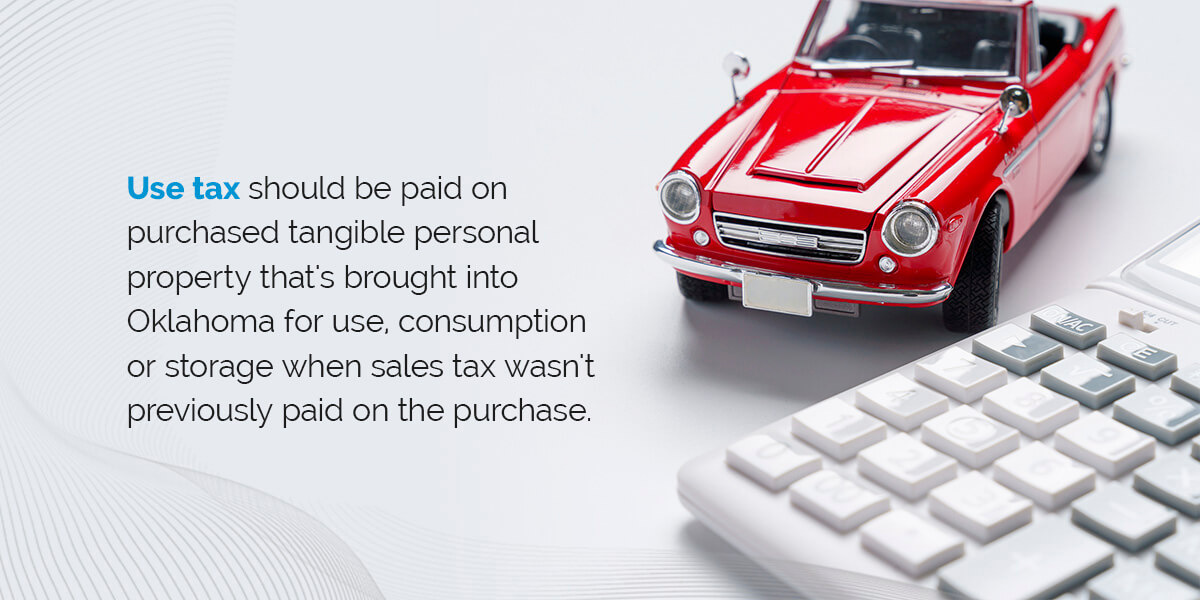
Use tax should be paid on purchased tangible personal property that’s brought into Oklahoma for use, consumption or storage when sales tax wasn’t previously paid on the purchase.
This tax is typically assessed on items purchased from out-of-state retailers and items purchased from in-state retailers who aren’t required to collect sales tax. If this property is brought into a municipality or county that levies a use tax, you may also need to pay the applicable municipal or county use tax.
Retailers that maintain a business in the state or make sales from a business outside Oklahoma for use in the state must also collect the appropriate state and local use tax from the customer. Use tax in Oklahoma is made up of two types — vendor and consumer:
Individuals may also pay use tax on untaxed items. For example, if an individual purchases something from a company online that’s outside of Oklahoma, and it’s shipped to them but they didn’t pay tax on it, they may owe use tax.
For your business to be subject to sales tax collection and the relevant rules in Oklahoma, it must have nexus established and use or sell a good or service that’s subject to state sales tax. Your business can be tied to Oklahoma if you have either physical or economic nexus.
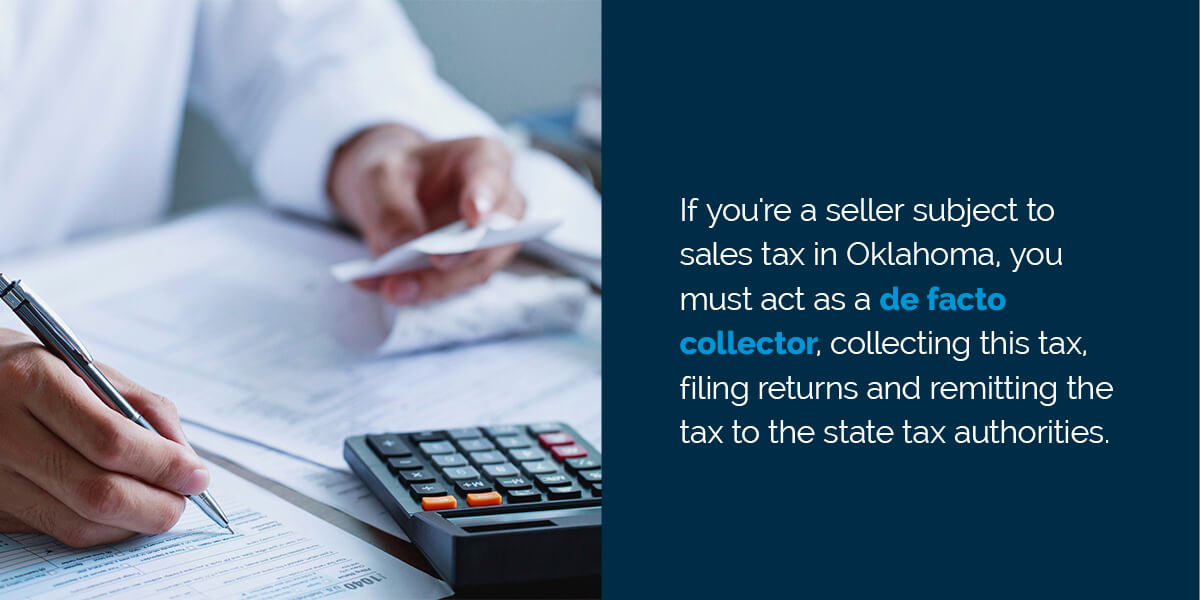
If you’re a seller subject to sales tax in Oklahoma, you must act as a de facto collector, collecting this tax, filing returns and remitting the tax to the state tax authorities. When the following factors apply to you, you need to collect sales tax:
Remote sellers who don’t have a place of business in the state are still required to charge and collect state and use tax from the customer if they sell a minimum of $100,000 of taxable merchandise in Oklahoma in the current or previous calendar year.
If you’re a remote seller who doesn’t sell $100,000 of taxable merchandise, you must still notify buyers via your website and invoices that use tax is imposed and buyers must pay it unless there’s an applicable exemption. You also need to send an annual statement to your customers in Oklahoma notifying them of their total purchase amounts made in the previous calendar year.

In Oklahoma, business owners need to register for a sales and use tax permit with the Department of Revenue Services. You need a permit if your business is selling tangible personal property. Tangible personal property refers to property that can either be seen, touched, measured, weighed or perceived by the senses.
Any of the following factors establishes nexus:
As noted above, your business can be tied to Oklahoma if you have either physical or economic nexus. When you have physical nexus, you have enough tangible activity or presence in Oklahoma to be required to pay sales tax. When you have an economic nexus, this means you pass Oklahoma’s economic threshold for the number of transactions or total revenue.
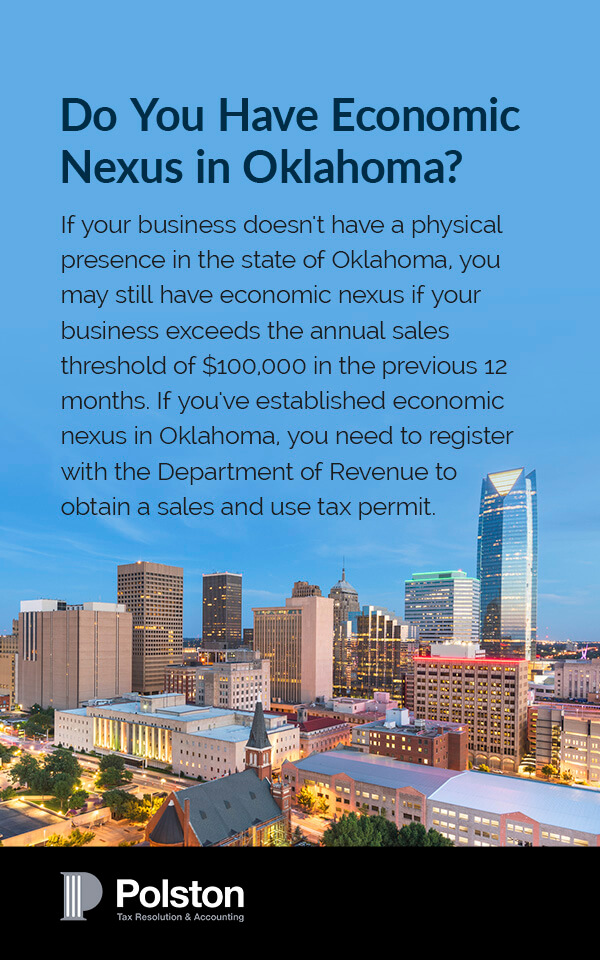
If your business doesn’t have a physical presence in the state of Oklahoma, you may still have economic nexus if your business exceeds the annual sales threshold of $100,000 in the previous 12 months. If you’ve established an economic nexus in Oklahoma, you need to register with the Department of Revenue to obtain a sales and use tax permit.
In Oklahoma, you’re considered a seller with physical nexus if any of the following applies:
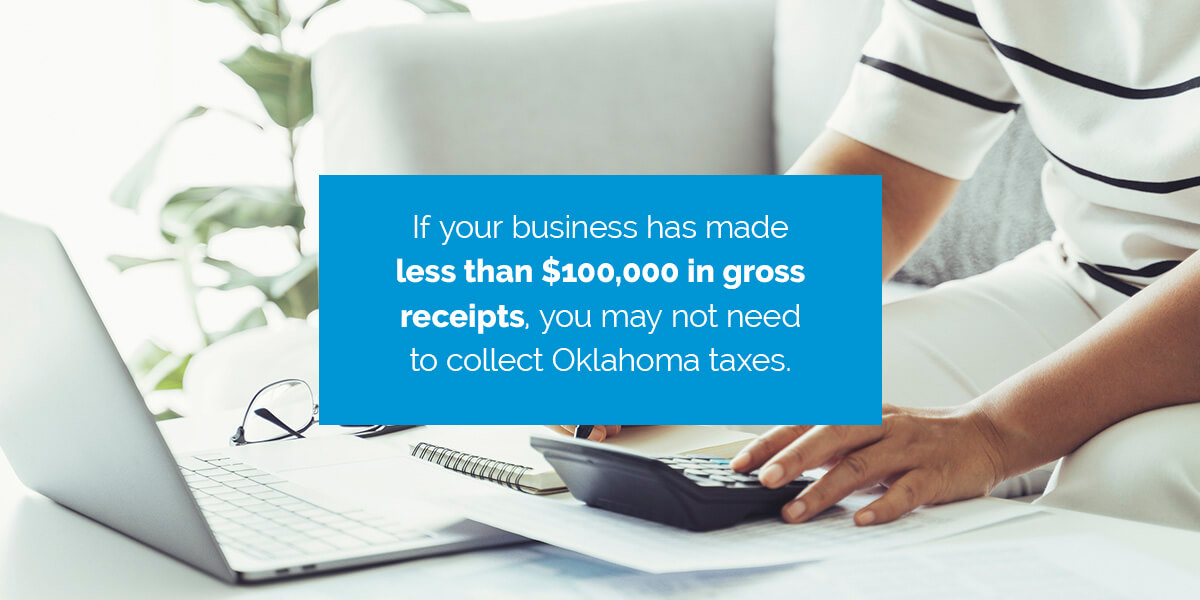
Remote and marketplace sellers should collect sales tax for sales made in Oklahoma. There are only two exceptions to this rule. If your marketplace facilitator collects sales taxes, you don’t need to. If your business has made less than $100,000 in annual gross receipts, you may not need to collect Oklahoma taxes.
A marketplace facilitator is an entity that performs the following:
If you sell through a marketplace facilitator like Amazon, you may not need to collect sales or use tax on these sales if the marketplace facilitator collects and reports sales tax on them. However, these sales may count toward your total sales threshold, so you’ll be required to collect tax on sales you make directly through your website or another marketplace that doesn’t collect sales tax for you.
Businesses typically collect taxes for their customers’ convenience, as customers would otherwise need to pay use tax if they don’t pay sales tax.
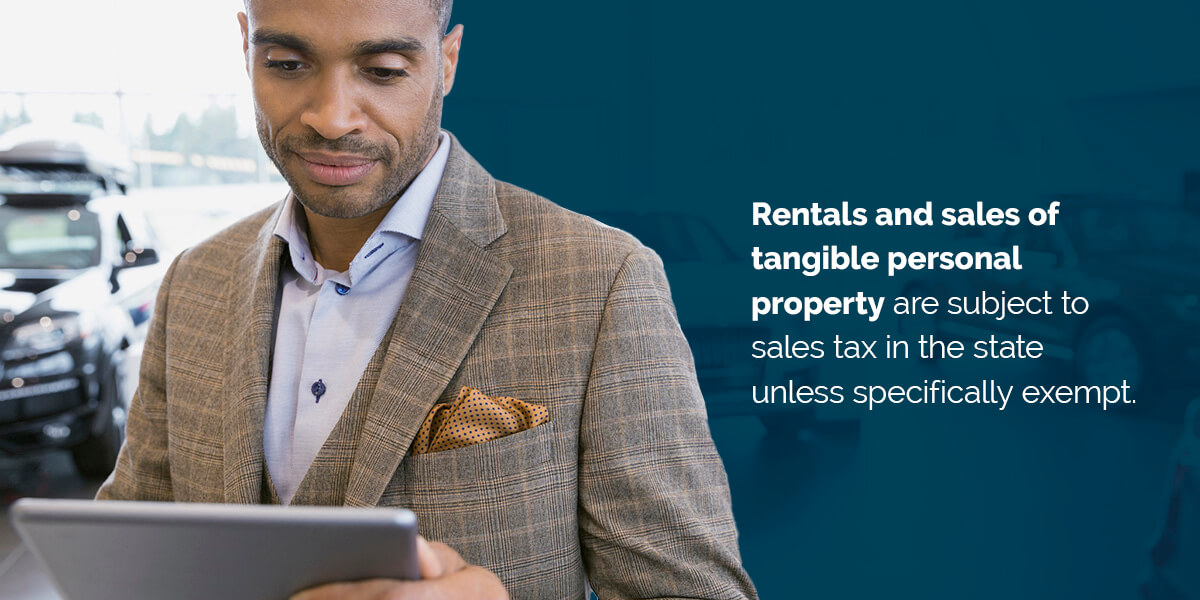
If you’ve determined you have nexus in the state of Oklahoma, you should now determine whether the services or products you sell are subject to the state’s sales and use tax. Rentals and sales of tangible personal property are subject to sales tax in the state unless specifically exempt.
Though these rules can seem straightforward, applying Oklahoma tax rules to your business can be difficult. If you’re struggling to handle or understand Oklahoma state tax for sales, turn to us at Polston Tax. Our Oklahoma City tax attorneys are here to help.
In Oklahoma, sales and use tax is the most common tax paid by business filers. Counties and cities also levy sales taxes that are added to the state’s sales tax rate. Depending on the special tax, a retailer or wholesaler must collect the tax and remit payment to the Oklahoma Tax Commission.
Other related taxes include hotel room occupancy tax, alcohol tax, motor vehicle excise tax, discretionary taxes and tobacco taxes.
A lodging tax isn’t charged at the state level in Oklahoma, but certain cities and counties charge a lodging tax. Each quarter, this tax can change. As of the first quarter of 2025, the following cities and counties impose a lodging tax:
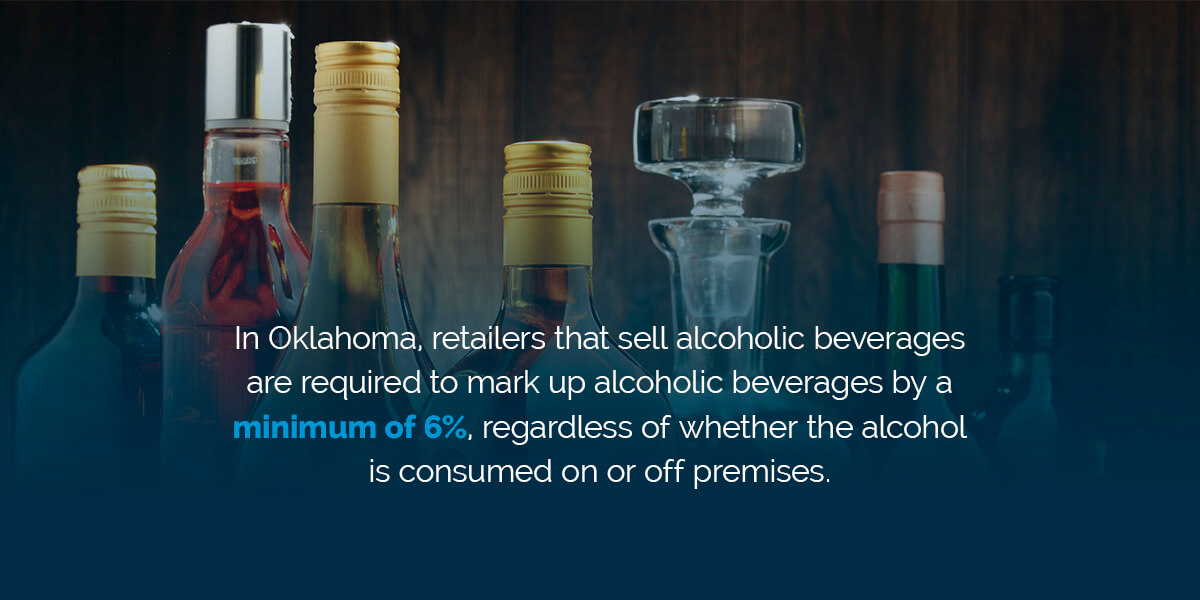
In Oklahoma, retailers that sell alcoholic beverages are required to mark up alcoholic beverages with a 13.5% mixed beverage tax, regardless of whether the alcohol is consumed on or off premises.
The vehicle excise tax in Oklahoma applies as follows:
A number of counties and cities in Oklahoma impose a local sales tax. If your business is located in a city or county in which discretionary taxes are charged, your business should collect taxes owed for those locations, plus state sales tax.
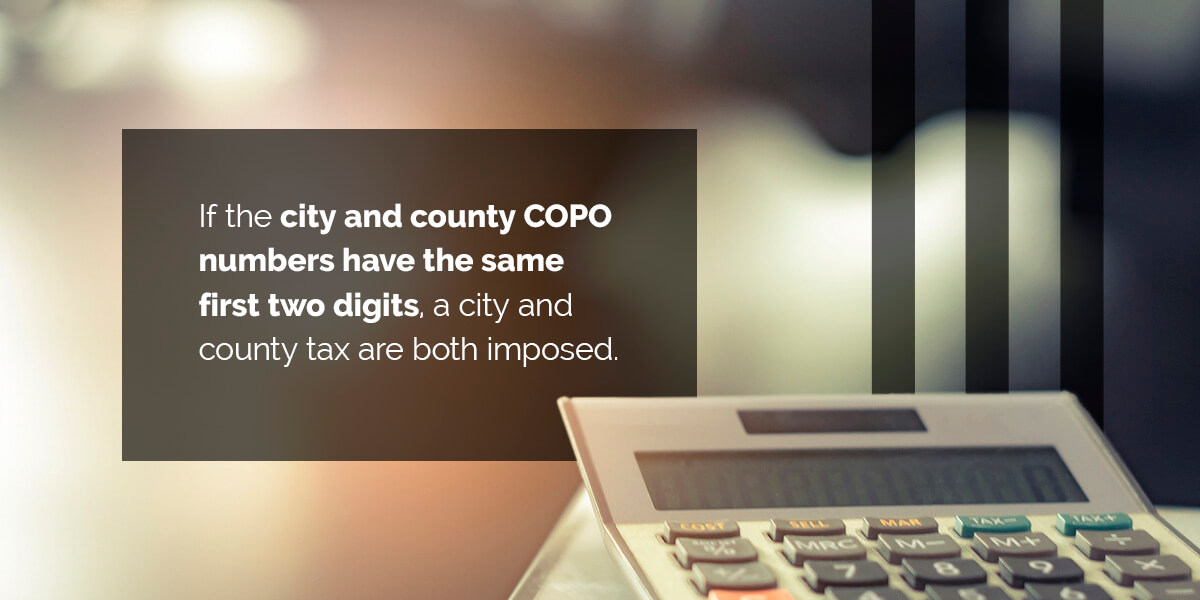
To determine whether your business must collect these taxes, review the COPO number. If the city and county COPO numbers have the same first two digits, a city and county tax are both imposed.
For example, the COPO of Mayes County is 4988, and the COPO of Salina is 4914. Because the first two digits match, a business would need to collect both the county and city taxes.
In Oklahoma, a tax stamp is used to show that taxes are paid on tobacco products. If a wholesaler pays this tax, it add this tax to the purchase price of the tobacco product. Tobacco products that may be subject to this tax include cigarettes, cigars, smoking tobacco and smokeless tobacco.
A retailer should add the following taxes on the sale of these products:
Note that Oklahoma has unique tobacco tax rules when it comes to Native American tobacco sales. These taxes differ based on the terms of compacts negotiated with the state. Currently, several nations, including the Muscogee, Osage and Quapaw Nations, are in negotiations for new tobacco tax compacts. Old compacts have either expired or been extended while negotiations continue.
Previous compacts from 2013 set a “unity rate” tax of $1.03 per pack. Each tribe had a unique formula for which percentage of the revenue went to the state and which percentage went to the tribes.
Several entities are exempt from state sales tax. Oklahoma sales tax-exempt items include:
To qualify as exempt from sales tax, you must provide certain documents.
Oklahoma has a sales tax holiday that occurs on the first Friday through Sunday of August. During the Oklahoma sales tax holiday, consumers can buy clothing tax-free as long as it costs less than $100.
If your business meets the criteria for being required to collect sales tax and you fail to do so, you’ll be responsible for the tax due, along with any applicable interest and penalties charged. Because it may be nearly impossible to collect the sales tax from your customers after a transaction, it’s essential to set up your tax collection efforts at the point of sale.
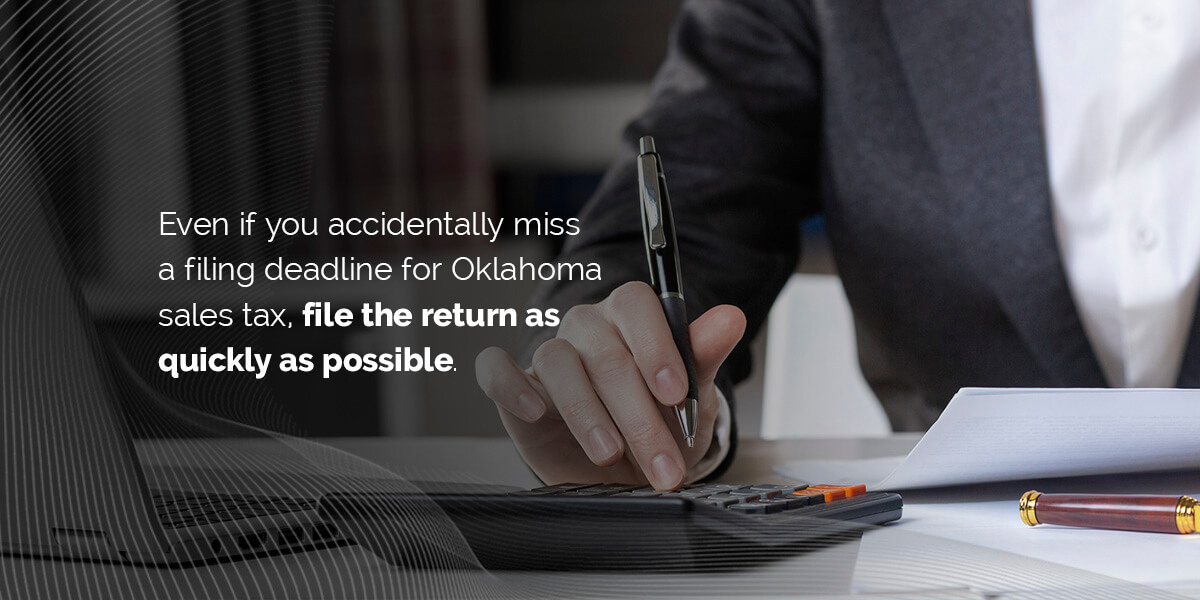
Even if you accidentally miss a filing deadline for Oklahoma sales tax, file the return as quickly as possible. Failing to file a return and remit the collected tax on time could lead to interest charges and penalties. The longer you wait, the greater the interest and penalty.
Contact the Oklahoma Tax Commission to learn about a potential acquisition’s current status if you’re planning to acquire a business. After you buy the business, you’ll be responsible for its outstanding sales and use tax liability.
Choose one of the options below if you should’ve collected sales tax in Oklahoma but didn’t:
There’s no one-size-fits-all solution. Our sales tax professionals can help you determine which solution may be the most cost-effective for your business.
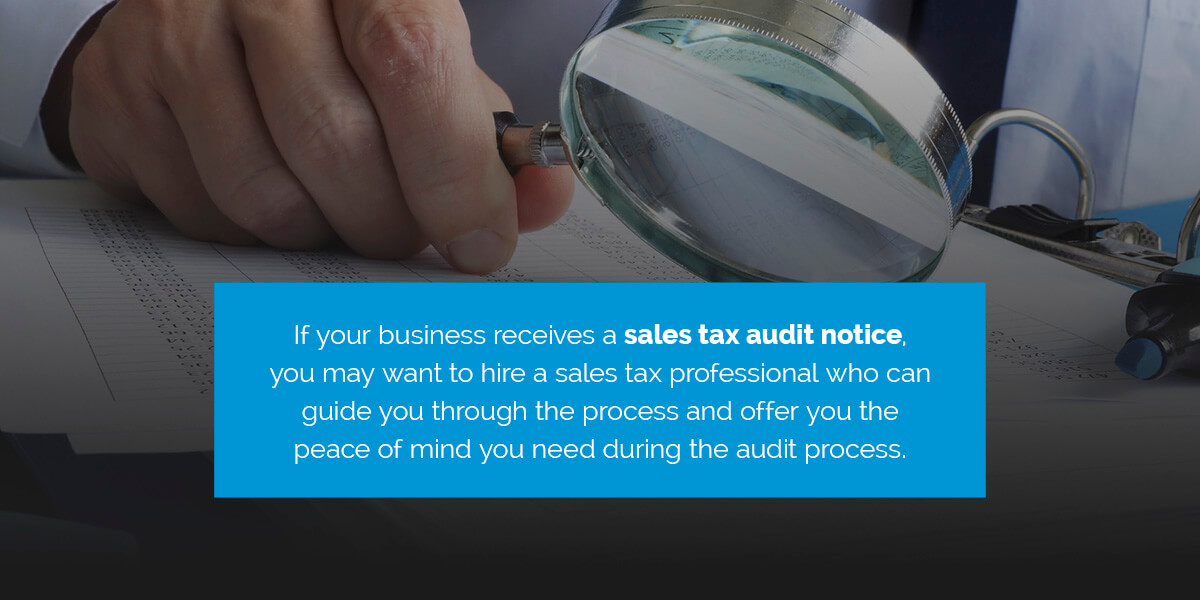
If your business receives a sales tax audit notice, you may want to hire a sales tax professional who can guide you through the process and offer you the peace of mind you need during the audit process. Consider the following factors to determine whether you should work with a professional if you receive an Oklahoma sales tax audit notice:
If you know you’ll be facing a sales tax audit in Oklahoma, you may want to know what to expect from an auditor. The following are a few of the steps you can expect the auditor to take:
The following are some of the areas that may be audited:
It’s crucial to understand the rights of your business after the audit. After the audit is completed, the auditor may hold an exit conference for you. The auditor produces an audit report and corresponding papers to support their assessment of your Oklahoma sales and use tax.
During this meeting, you may want to have a sales tax professional at your side. You’ll view the auditor’s findings, and you may need to contest areas where the auditor misapplied sales tax laws or overstepped their bounds.
Wait to agree on the sales tax assessment until after a sales tax professional reviews it for any issues. You may be able to reduce your company’s sales tax liability when you partner with a professional who thoroughly understands the sales tax laws in Oklahoma.
Once you’ve determined that your business may need to collect and remit sales and use taxes, you should know how to register and file Oklahoma taxes.
To pay sales tax in Oklahoma, register online for a tax account. After you register, you can submit tax returns and remit the tax payments. Unless your business receives an exemption, you should file reports and remit taxes via the Oklahoma Tax Commission’s website.
To apply, you’ll need to provide information about your business, such as:
To properly file your sales tax in Oklahoma, you should calculate the amount you owe, file a return and make your payments. You can use online calculators that can perform this calculation for you or reach out to a tax professional at Polston Tax who can calculate the sales taxes you owe in Oklahoma.
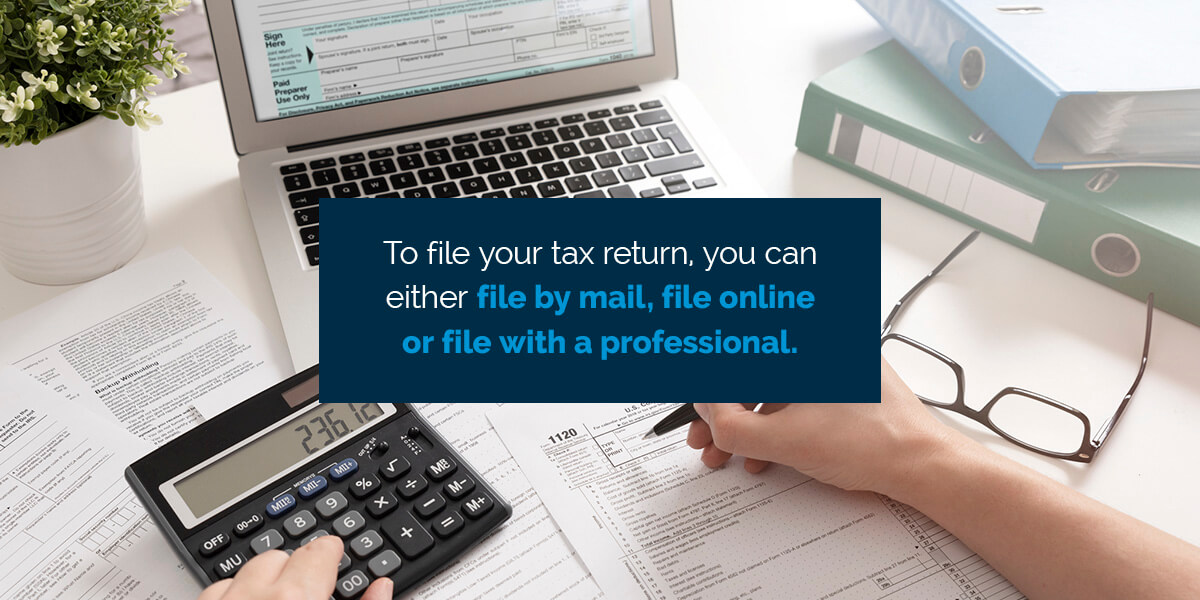
To file your tax return, you can either file by mail, file online or file with a professional:
Depending on your company’s gross receipts, you need to file tax returns semi-monthly, monthly or semi-annually.
Your business should participate in the Tax Commission’s electronic data interchange program and electronic funds transfer if your tax liability is at least $2,500 per month.
For sales made between the 1st and 15th of the month, the due date is the 20th of the current month. For sales made between the 16th and the last day of the month, the due date is the 20th of the next month.
This means your sales between March 1 and March 15 are due March 20, and your sales between March 16 and March 31 are due before or on April 20.
Another possibility for the due date of your sales taxes is on a monthly basis. Payments and reports are due before or on the 20th day of the month in the month after you collect the taxes. For example, January’s taxes are due before or on February 20.
If your company’s tax liability doesn’t exceed $50 in a month, you can file semi-annually after you inform the Oklahoma Tax Commission. Your business must qualify by showing that it is transient, operates seasonally, makes incidental sales or makes sales through salespersons who don’t have an established business location.
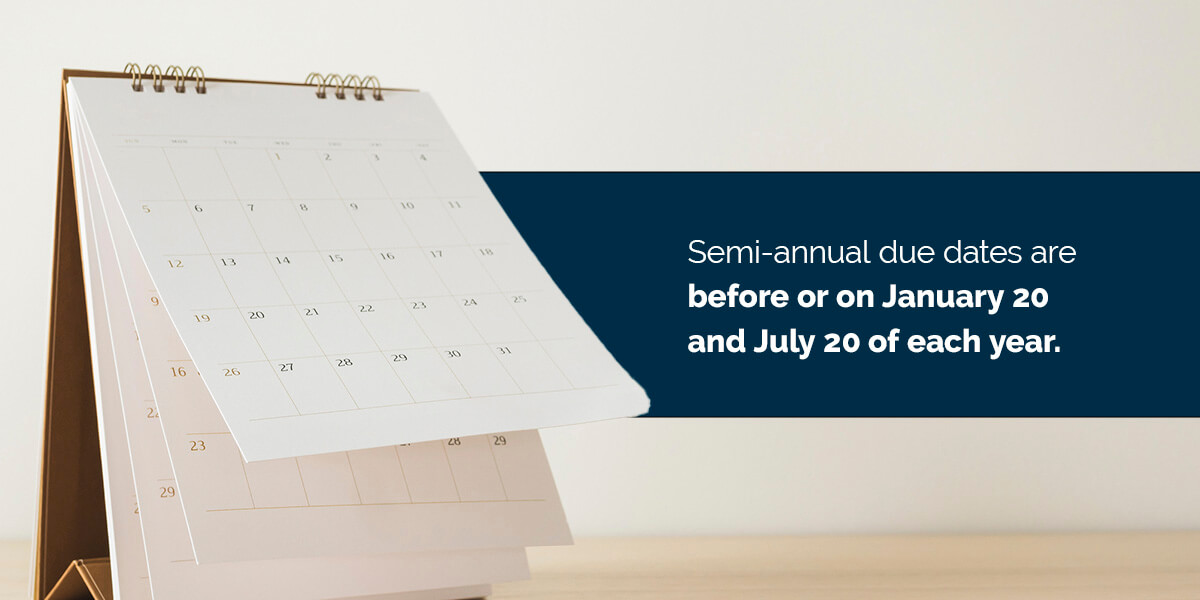
Semi-annual due dates are before or on January 20 and July 20 of each year. This means the taxes you collect between January and June are due before or on July 20.
Register online at the Taxpayer Access Point for your sales tax permit in Oklahoma. Alternatively, you can register in person at the Oklahoma Tax Commission offices in Tulsa or Oklahoma City. Have the following information on hand when you register for your sales tax permit:
Keep in mind you’ll need to pay an application fee for a sales tax permit in Oklahoma, and if you pay with a card, you may need to pay a convenience fee. Additional business registration fees may also apply.
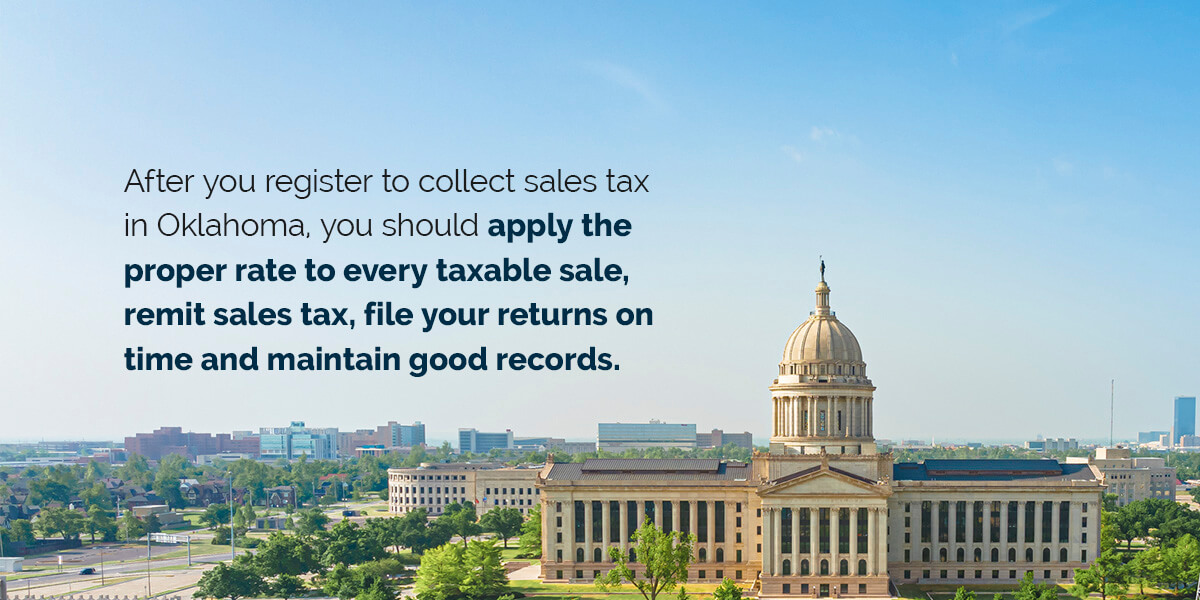
After you register to collect sales tax in Oklahoma, you should apply the proper rate to every taxable sale, remit sales tax, file your returns on time and maintain good records. How you collect sales tax in the state is impacted by how your business sells goods:
If you need to collect sales tax, you should also consider how to collect taxes on shipping and handling. In Oklahoma, if shipping and handling charges are separately stated, they’re tax-exempt. However, if these charges are included in your sale price, they’re taxable.
There are some exceptions to the rules for sales tax associated with shipping and handling, so you may want to turn to a tax professional who can guide you through the process.
At Polston Tax, we have a team of accountants licensed in Oklahoma and throughout the United States. We also have attorneys, financial analysts and tax professionals. Our wide-ranging tax knowledge makes us a reliable choice for sales tax support.
We can help you with numerous tax requirements, including offering sales tax representation throughout the audit process. Contact us to learn more.
